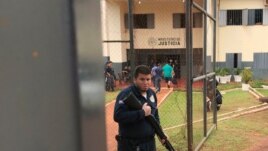09 February 2020
Luis Alves da Cruz awoke in the middle of the night. He heard the sounds of loud activity in the Paraguayan prison where he lived. Later, he told police that he saw a group of other prisoners wearing all black clothing. "We're breaking out," one of them told him. "Are you coming?"
Da Cruz is 30 years old and a native of Brazil. He is in prison for smuggling illegal drugs. Within minutes, he was among 75 prisoners who fled the prison in the early hours of January 19. It was one of the most shocking escapes in Paraguay's history.
The fleeing prisoners were members of the First Capital Command. The group is also known as the PCC. PCC is Brazil's largest and most powerful criminal organization. The escape demonstrates the organization's growing influence in Paraguay. The country's weak institutions have been unable to deal with the PCC and other Brazilian criminal groups that are growing quickly there.

A guard is seen at the border prison, where prisoners, housed in a gallery for members of Brazil's First Capital Command (PCC) gang, broke out of the jail in Pedro Juan Caballero, Paraguay January 22, 2020. Picture taken January 22, 2020. REUTERS/Gabriel
Cecilia Pérez is Paraguay's Justice Minister. She said officials at the prison in the city of Pedro Juan Caballero near the Paraguay-Brazil border knew what the PCC was planning. Some even helped the escape effort, she said. Thirty-two prison officials, including the jail's warden, are now under arrest.
"We're facing a security crisis whose epicenter lies in the prison system," Pérez told the Reuters news agency.
The Pedro Juan Caballero Regional Penitentiary did not answer Reuter's request for comment.
Forty of the escapees, including da Cruz, were Brazilians. So far, officials have recaptured only 11 prisoners. They found da Cruz within days of the escape near the Brazilian town of Dourados. Brazilian police let a Reuters reporter read the records of what da Cruz said about the escape.
Da Cruz told police that guards at the Paraguayan prison had helped with the escape. He said he was among those who fled through a tunnel that prisoners had dug. The tunnel had a fan to bring in fresh air and even electric lights. The tight passage started in a cell holding PCC members and exited just outside the jail's outer wall.
Older prisoners simply walked out the front door.
"This (escape) demonstrates that the PCC does what it wants, when it wants," said Juan Martens. He is an education and security researcher based in the capital Asunción. He has studied the PCC's activities in Paraguay. The Paraguayan state represents no barrier to its plans, he said.
‘City of Blood'
Paraguay is one of the world's top producers of the illegal drug marijuana. It is also a major transportation point for all the illegal drug cocaine, made in the Andes Mountains. Transparency International's 2019 Corruption Perceptions Index lists it as the second-most-corrupt country in South America, after Venezuela.
As a result, it has become a desirable operational base for Brazilian criminal organizations. This includes the Sao Paulo-based PCC, Rio de Janeiro's Red Command and a Porto Alegre group called Bullet In The Face. Officials say Brazilian criminals operate with little fear of the law here, both inside and outside the prison.
The area around the prison, Pedro Juan Caballero, has been called the "city of blood." Small planes carrying Bolivian cocaine often touch down on landing areas outside Pedro Juan Caballero, Brazilian and Paraguayan officials told Reuters. From there, they said, the drugs move through southern Brazil and on to Europe, where demand is high.
The effects can be seen in the rising number of deaths in Pedro Juan Caballero. Gangs fight to control drug transportation pathways, officials said. Mayor Jose Carlos Acevedo said there were more than 150 killings last year in the city of 120,000 people. He said residents live in fear of the gangs.
"The police are completely corrupt," Acevedo said. The city's police force, which does not report to Acevedo, did not answer Reuters' requests for comment.
Pérez, the justice minister, said Paraguay would work together more with Brazil's right-wing government. Brazilian leaders are trying to limit the gangs' activities by hitting their finances and sending bosses to high-security federal prisons.
Gilberto Fleitas, the Paraguayan criminal investigations chief, doubts the chances of success.
"There's no way that anyone...can stand up to this," he said. The gangs "identify your family, they coerce your relatives, judges, prosecutors, police."
I'm Dorothy Gundy.
And I'm -Pete Musto.
Gabriel Stargardter and Daniela Desantis reported this story for the Reuters news agency. Pete Musto adapted it for VOA Learning English. Kelly Jean Kelly was the editor. Write to us in the Comments Section or on 51VOA.COM.
_______________________________________________
Words in This Story
smuggling – v. moving someone or something from one country into another illegally and secretly
institution(s) – n. an established organization
warden – n. an official who is in charge of a prison
epicenter – n. the central point of something, usually a difficult or unpleasant situation
tunnel – n. a passage that goes under the ground or through a hill
gang(s) – n. a group of criminals
coerce – v. to make someone do something by using force or threats